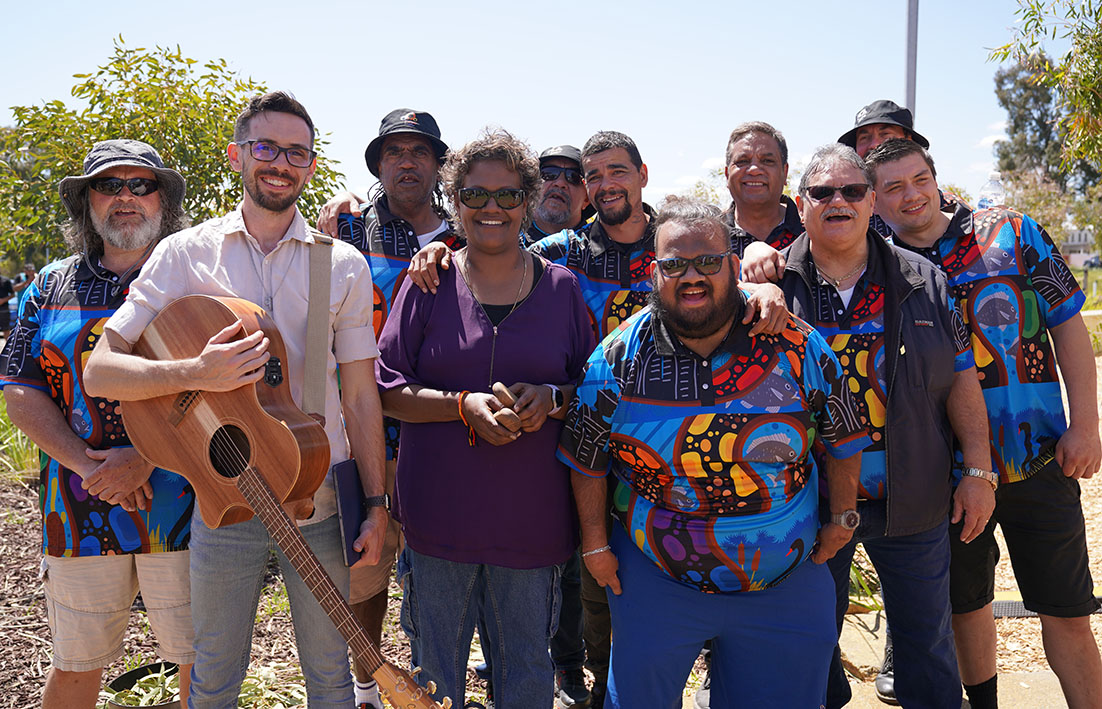
IN the spring sunshine, the sound of lullabies written in Noongar language filled Weeip Park as Moorditj Maaman took the stage at Midland’s NAIDOC celebration.
Midland’s Moorditj Maaman men’s group began recording their first songs at Aerial Recording Studio in Glen Forrest in July as reported in Lullaby legacy for Noongar men.
The project is a celebration and preservation of Noongar language, and the first time Community Art’s Network’s (CAN) Lullabies project had featured a majority of male singers.
Students from Woodbridge Primary School joined the Moorditj Maaman group on stage to sing along and the crowd cheered between each song.
CAN Language facilitator Kobi Arthur Morrison said the performance was a testament to the confidence that’s grown in the singers since their first recordings.
“We didn’t want to push (Moorditj Maaman members) away by doing too much because it was all fairly new to some people,” he said.
“But we went through each song, and the group has really been working to make sure they’ve learned them all and seeing how enthusiastic they are now, we’ve got nothing to be worried about.”
The group performed three songs off of the album: Booraka Yagan, Maawit Keny Kedala, and Yeyi Yokai.
While Booraka Yagan and Yeyi Yokai were group collaboration songs, translating to Brave Yagan and Now Celebrate respectively, Maawit Keny Kedala was written solely by Moorditj Maaman member Troy Coleman.
The album will feature works from individual members which speak to their own unique connections to Noongar language.
Mr Coleman works at Governor Stirling as an Aboriginal and Islander education officer and said he endeavoured to be a positive role model for the students.
He said his song was inspired by seeing a coworker bringing in their newborn to work every day.
“I was wondering what I should write as a song for the Lullabies album, but one of the fellas I was working with started bringing his baby in every day,” Mr Coleman said.
“Seeing the baby every day, I started to really develop a special connection seeing them go through cycles of playing, resting, crying and laughing through the day.
“That’s where I got the idea to write Maawit Keny Kedala which means one day baby, telling the story of the day in the life for a baby.”
Mr Coleman said his own relationship with language came from memories of his mother.
“My mother came from the stolen generation,” he said.
“She only passed five years ago, but I remember the stories about her time after being taken to a mission.
“When she came out of the mission, she wasn’t allowed to speak language or practise her culture, and that took a toll on her.
“To me the importance lies in the fact that I’ve got a daughter, and maybe someday I’ll have granddaughters and I’d like them to be able to have the language my mother couldn’t.
“So, when I was able to write Maawit Keny Kedala and make it sound like a mainstream lullaby but sung in language, that was an awesome achievement.
“I’d like to imagine my granddaughters one day hearing a lullaby in language on somewhere like Playschool, and not think twice about it.”
Maaman Weitj: Noongar Lullabies from Swan will launch at Mandoon Estate on November 2, and more information can be found on the CAN website.